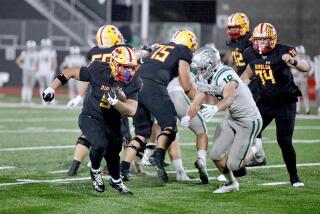BCS Has Laws but Little Order
- Share via
Put up your hands, Cal, we’re the BCS Police and we’ve got you surrounded! There’s no way out!
Perhaps never in the history of sport have a team’s postseason hopes been so confounding, convoluted and disturbing as California’s quest to make its first Rose Bowl appearance since 1959.
Four-letter words used to describe this “Cal Conundrum” range from “what?” to ... well, we’d better not say.
“There’s a disbelief,” athletic department spokesman Bob Rose said this week of the unfolding scenario. “There is the human element here. Cal hasn’t been to the Rose Bowl in 45 years, we can almost touch it.”
The ridiculousness of the situation can’t be overstated, what with Cal’s possible passage to Pasadena hinging on Friday’s game between Texas and Texas A&M; in Austin.
It could come down to this, Cal fans: You may need Texas to win the game but not by too much.
So, cheer for Texas A&M; to dominate but Texas to win on a touchdown where the ball caroms off the field judge’s head into a Longhorn receiver’s arms.
Cal is 9-1 and No. 4 in the bowl championship series standings. Texas is No. 5.
Yet, there is a chance Cal could finish 10-1 after a win over Southern Mississippi on Dec. 4, maintain its No. 4 ranking and get shut out of the Rose Bowl.
How to explain this?
It’s not easy, so we’ll go remedial.
The six BCS conference champions -- Pacific 10, Big Ten, Atlantic Coast, Big 12, Southeastern, Big East -- receive automatic bids into one of the four major bowls: Rose, Sugar, Fiesta or Orange.
It doesn’t matter that Michigan has two losses. It won the Big Ten, so it goes to the Rose Bowl.
That leaves two at-large spots available for teams that meet the BCS criteria.
If USC wins its last two games and stays No. 1, it will play in the Jan. 4 Orange Bowl for the national title.
Because it would be losing the Pac-10 champion, the Rose Bowl would get first choice in the selection process and is itching to take 10-1 Cal to match against Michigan.
This is where it gets dicey.
In 1998, when the BCS was created, commissioners created a provision that stipulates any team from a non-BCS conference receives an at-large bid if it finishes No. 6 or better in the final standings. This was done to keep non-BCS schools from filing antitrust lawsuits.
The BCS also did something else after the 1998 season that now has Cal in a BCS straitjacket.
In 1998, Kansas State lost an overtime game to Texas A&M; in the Big 12 title game, knocking Kansas State from the national-title game all the way to the Alamo Bowl even though the Wildcats were No. 3 in the final BCS standings.
The BCS thought this was unfair, so they added what is known as the “Kansas State” amendment, which guaranteed that the BCS No. 3 or No. 4 (in certain situations) would be guaranteed a bid.
Today, Cal finds itself trapped between two BCS bylaws.
In what could be a “perfect storm” scenario, Boise State this week climbed to No. 7 in the BCS. Utah, another non-BCS school, already has clinched a berth.
If Texas loses to Texas A&M; and Boise State climbs to No. 6 in the BCS, Utah and Boise State earn bids even though they would be ranked lower than Cal.
How could this be?
Well, the BCS never fathomed two non-BCS teams would make the top six and, in constructing its bylaws, did not craft a disclaimer for this possibility.
So, provision “2” in the BCS rule book relating to non-BCS qualifiers trumps provision “4,” the guarantee for finishing No. 3 or No. 4
And what if Texas defeats Texas A&M; in convincing fashion?
Well, that takes care of Boise State getting to No. 6 but creates the possibility Texas could jump Cal for the automatic BCS spot at No. 4.
It appeared Cal’s No. 4 position was bulletproof until this week when, suspiciously and inexplicably, Cal lost ground to Texas in the writers’ and coaches’ polls even though it defeated Stanford by 35 points and Texas was idle.
Cal’s BCS lead over Texas went from .0382 to .0203 and left open the chance Texas could pass Cal in the BCS with an impressive victory over Texas A&M.;
Cal might regain the lead should it rout Southern Mississippi, but Golden Bear Coach Jeff Tedford has stated this week he would not run up the score even if he could, a position that is admirable even if it might cost Cal a Rose Bowl bid.
You might understand some voters having to move Texas up if they had the Longhorns ranked behind Michigan and Florida State, which both lost.
But how do you explain Cal actually losing points in the coaches’ poll, going from 1,311 points last week to 1,299?
Of course, the coaches’ vote remains anonymous, so we’ll never know how the seven voting coaches from the Big 12 viewed the race between Texas and Cal.
Lest you perceive a West Coast bias here, be assured this would be equally wrong had Texas lost ground to Cal after a 35-point win over Baylor while Cal was resting on the couch.
If you ever doubted the system that decides college football’s champion is seriously flawed and bordering on fraudulent, doubt no more.
Welcome Back, Ball Coach
Steve Spurrier was introduced this week as the new coach of South Carolina and immediately predicted the Gamecocks would win the national title within two years.
OK, that’s what we wish he would have said.
Obviously, Spurrier’s failed experience with the NFL’s Washington Redskins has taken some spunk out of the 59-year-old coach.
Spurrier now says he would be happy if South Carolina could win the conference title.
“We’re not really talking national,” Spurrier said on a teleconference with national reporters. “ ... If someday we can come out of that Georgia Dome winning the game, and winning the SEC, I would think that would be an achievement that would thrill South Carolina as much as anything.”
Spurrier also said the South Carolina job did not come with a guarantee of membership at Augusta National Golf Course, whose chairman is former Gamecock player Hootie Johnson.
Anyway, who has time to putt around these days? “I’m really sort of golfed out,” Spurrier said.
Spurrier said he might retain as many as four assistants from Lou Holtz’s staff.
After winning six SEC titles and a national title in 12 years at Florida, Spurrier left Gainesville in 2001 to coach the Redskins. He quit after two years and a record of 12-20.
“I had two losing records in the NFL and I’ll take full blame and full responsibility for it,” he said. “As Bill Parcells says and I agree with him, a coach is whatever his record is and I wasn’t a very good coach.”
Spurrier said the reason he didn’t return to coach Florida was “I was never asked.”
Spurrier also said he was not bothered having to play his alma mater every year. “That’s only one week out of 52 weeks,” he said.
Biggest change in the SEC since he left?
“Well,” Spurrier said, “Auburn’s better this year, that’s a difference right there.”
Hurry-Up Offense
The Cal situation, an addendum: Current BCS bid qualification rules will not apply in 2006 when the new contract kicks in. A “fifth” game will join the BCS rotation, creating two more at-large positions, meaning the Rose Bowl would be able to take Cal if the circumstances were the same.
Bowl watch: The BCS released schools not being considered for at-large bids this week and that allowed bowls to start offering teams official invitations. With 55 schools already qualified, it appears there will be enough schools available to fill 28 bowl games. There are still scenarios, however, in which there will not be enough schools available. The Big 12 has received a waiver that will allow its North Division champion to play in a bowl even though that yet-to-be-determined team will be 6-6 if it loses to Oklahoma.
Clemson-South Carolina fallout: It sure was magnanimous for the presidents of both 6-5 schools to pull their teams out of the bowls as a result of last week’s pregame fight among players. Denying Clemson players the chance to play a bowl game in Boise and South Carolina players their date with destiny in the Independence Bowl should serve proper notice. Only a cynic would wonder whether either team would have been stripped of bowl privileges had they been vying for a $14-million BCS bowl.
Utah senior safety Morgan Scalley on being part of the first non-BCS team to qualify for a major bowl: “I don’t think it will hit until probably 10 years from now,” he said after his team’s 52-21 victory over Brigham Young. “And I think a lot of guys won’t understand how great this is until probably they have children.”
Good news/bad news for Notre Dame fans: The last coach to lead a team to victory against USC in the Coliseum was Tyrone Willingham. Unfortunately, he was coaching another school at the time. On Sept. 29, 2001, Willingham’s Stanford squad defeated USC, 21-16, dropping first-year Trojan Coach Pete Carroll’s record to 1-3.
More to Read
Go beyond the scoreboard
Get the latest on L.A.'s teams in the daily Sports Report newsletter.
You may occasionally receive promotional content from the Los Angeles Times.










